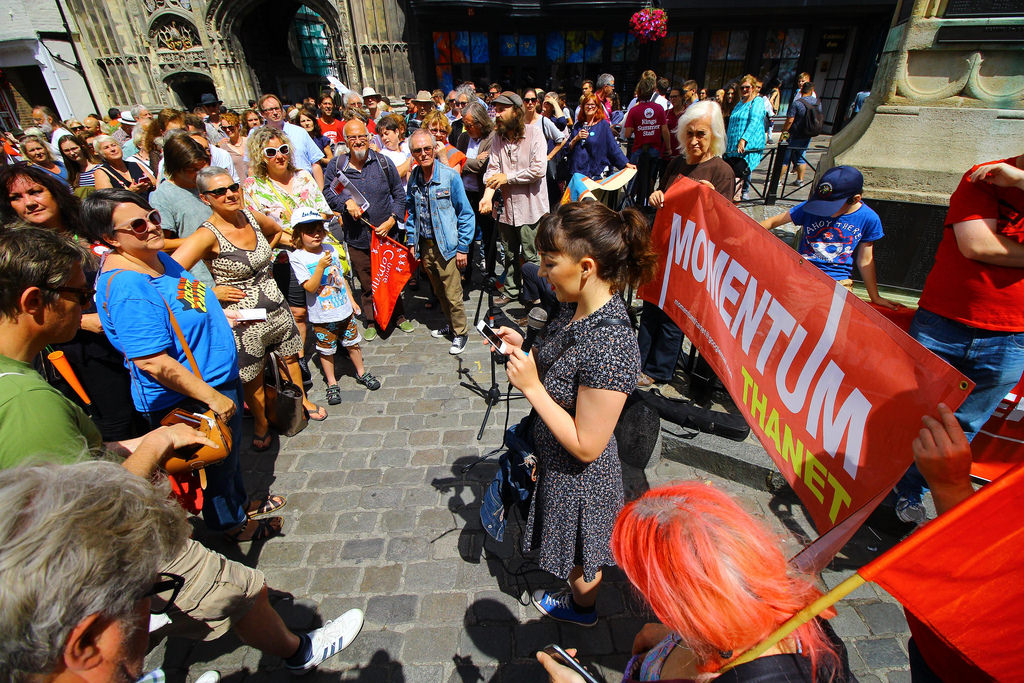Opposition to Momentum’s Festival Comes From Fear of the New Politics It Represents
by Andrew Dolan
20 August 2016

The entryists are at it again. Momentum, this party within a party, is organising a ‘rival event’ to run on the same weekend that Labour’s own annual conference takes place, and in the very same city too. According to Labour MP Tom Blenkinsop: “It’s part of the hard-left, the fringe of British politics. They’re not affiliated to UK Labour and are entryists.”
Such hyperbole is of course commonplace, although, thankfully, equally common is its general dismissal as just that – even if much of the press still insist on elevating the conspiratorial to that worthy of consideration. Scrape beneath the slung muck, though, and there is an interesting event taking shape under the title of The World Transformed.
In Momentum’s words, “The World Transformed is a celebration of politics, art, music, culture and community. Hosted by a coalition of grassroots groups and powered by Momentum, The World Transformed will promote a radical, positive vision for the future.”
Nothing sinister here, and very much standard fare for a left-wing get-together: meet people, discuss ideas, share experiences, imagine a better future. All important things, even if at times such activities can become a little self-indulgent or overly abstract.
Why all the fuss, then? Well, beyond the usual red-baiting there is something else at play here. For when and where you do something is often as important as what you do, and the presence of The World Transformed so close – in both time and space – to the Labour party conference represents, in fantastically symbolic fashion, the interruption of the old by the new.
After all, there are few occasions in the political calendar that better illustrate the hollowed-out, hyper-mediatised entity the Labour Party has become over the last 30 years than its conference. It was Tony Blair who finalised its transformation into a stage on which to uncritically present the party leader to a largely adoring audience, and to reduce the passing of policy to a performance based on a script written sometime before and by a director with total control. Conference has in recent years been less about democracy or even its appearance; it’s about the leader’s performance.
Of course, New Labour is no more and today’s Labour party is passing through a period of convulsion unlike any other. Few are under the illusion that this year’s conference will be like those before it – even last year’s – especially as the prospect of a second Jeremy Corbyn leadership victory and a potential split looms large.
Yet for those profoundly influenced by the politics Blair perfected – and there are many in the parliamentary party – the presence of The World Transformed next to the once premier exhibition of New Labour triumphalism will serve as another powerful reminder that the parliamentary Labour party now lacks the ability to isolate and control the party grassroots as Blair did. More importantly, so too does it signal that an entirely new politics is emerging and cannot be easily swept aside.
Indeed, the protestations of those opposed to Momentum’s event in many cases betray not only their attitude towards Corbyn but also an ignorance of the ways in which digital technology enables groups with limited resources to more easily bypass hierarchies and assert influence in and beyond an organisation. Complain all you want, but the event is happening.
The complaints and accusations made also compare poorly to the relative ease with which in late 2014 the SNP accepted the Radical Independence Campaign’s conference was taking place within a stone’s throw of its own. The SNP, it seems, at least has some idea that renewal comes as much from outside the party as it does from inside, whereas there are still many in Labour deeply at odds with this political paradigm.
More than just the interruption of a spectacle, then, the coming together of these two events is in many ways a meeting of two different ways of doing politics. On one hand, an old model of politics as a stage-managed performance shorn of substance, of a political elite cushioned from accountability and of a refusal to acknowledge that business as usual simply isn’t working. On the other, a new model, not yet fully formed but carrying with it a conception of politics as participative, empowering and focused on radical change. Needless to say, discomfort towards The World Transformed is less about this one event than the politics it represents.
It is worth noting the line that separates the old and the new, the closed-minded and the curious, does not neatly mirror the division between those inside parliament and those outside of it, and nor does Momentum have a monopoly on radical change. There is, for example, much creative energy in many constituency Labour parties and across a wider terrain of popular struggle.
Still, regardless of who leads the Labour party into the next general election, many of the ideas discussed at The World Transformed will be crucial to its transformation into an organisation capable of getting around the crisis of social democracy that has for many years been playing out in Europe.
And to those Labour MPs and members with suspicious minds, I say: when you are in Liverpool for the party conference, go down to the wonderful Black-E, the venue for The World Transformed, for you might just see something that inspires you.
Photo: Funk Dooby/Flickr
–
If you want to support media for a different politics, you can donate or subscribe to Novara Media at support.novaramedia.com.